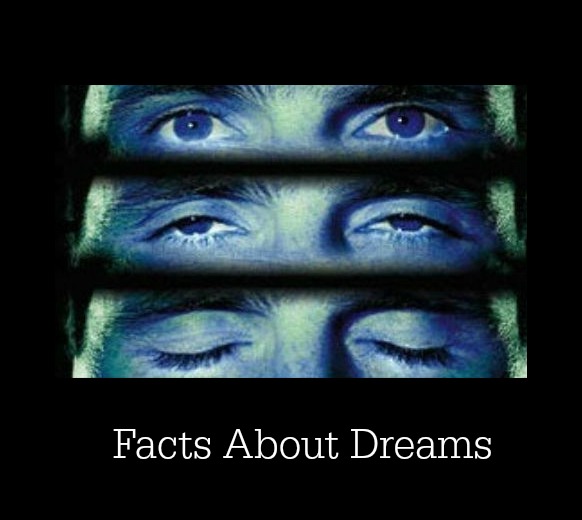Facts About Dreams By Lawrence Galton (1961)
All of us know we need sleep. But what we haven't known is that, even more than sleep, we need dreams. Without them, we'd go nuts. Not even scientists suspected that until a few months ago. While men of every age have speculated on the mystery of dreams, it's only recently that scientists have stopped speculating.
With completely new methods for looking into what goes on in our minds at night, they have been upsetting a great many old misconceptions and superstitions, discovering one fascinating fact after another, and building up a whole new science of dreams. Here's a look at what they've been finding out.
Research Shows That All of us Dream Every Night
And not just one dream, either. Each of us averages four to seven a night. We spend 1.5 hours or more - about 20 percent of our sleep time - in dreaming.
That's clear from years of research. It got started in 1952 because of accidental observation. While studying sleep cycles in infants, Prof. Nathaniel Kleitman and his associates at the University of Chicago Sleep Laboratory noticed that tots' eyes kept moving under their lids after all other body movements had stopped.
To find out more, the Chicago investigators had adult volunteers sleep on cots in the laboratory and stuck tiny electrodes on their eye sockets so electric recordings could be made of eye movements. Night after night, every sleeper showed jerky eye activity. The jerky movements came in clusters several times a night. Still puzzled, the investigators stuck some more electrodes on the sleepers' scalps so brain waves could be recorded. And they found distinctive brain-wave patterns showing up whenever the jerk eye movements appeared.
Could the brain and eye activity indicate dreaming? It was only a hunch, but sure enough when sleepers were awakened immediately after a burst of rapid eye movements they reported they had been dreaming. When they were awakened at other times - no dreams.
Although investigators haven't been able to monitor the sleep of everybody in the country, the evidence that everybody dreams every night is strong. For in all sleepers studied, consistently recurring dream patterns have been found, even in those who said they never dream.
Why We Forget Many of our Dreams
We're ashamed of them - so we suppress them. That's been one theory. It may be true to some extent. But other factors have been uncovered.
Dreams tend to burst apart quickly. Drunks and drugged people are notorious for having trouble remembering. And dreams involve a low-grade type of mental activity, using brain mechanisms much like those used by the drunk and drugged. Lab work has shown that if you delay awakening a dreamer even just five minutes after the end of the eye movements, the chances of dream recall are greatly reduced. After another five or ten minutes, there's very little chance at all of recall.
So ability to recall a dream may depend upon whether you happen to be dreaming at, or very shortly before, the time you wake up. There's a "tune-in" factor, too. Says Dr. Joe Kamiya of the University of Chicago: "I have observed prospective subjects who told me they very rarely dreamed but who began remembering dreams at home the day following my interview with them. So it seems to be a matter of attention - whether we are 'tuned in' to detect these private events."
Also, Dr. Donald Goodenough of New York State's Down-State Medical Center has found that some people dream so close to the waking stage, as shown by brain-wave recordings, that they think their dreams are only wakeful reveries. And here's a bizarre sidelight: You hear now and then of people who claim they never sleep. Actually, some scientists believe that such people sleep without knowing it - because they dream they're awake.
Torture Test: Going Without Dreams
If we dream so much, is there a reason for it? To find out, Dr. William Dement and other investigators at New York's Mount Sinai hospital put eight young men through what turned out to be a kind of torture test.
Night after night, as soon as the eight volunteers started to dream, as shown by eye movements, they were awakened. They were allowed to go back to sleep immediately after. So the dream-deprived sleepers got just as much sleep as sleepers in other experiments who were awakened only after finishing dreams. But during the day the dream-deprived - unlike the others became irritable and upset. They showed anxiety, had difficulty in concentrating. One left the study in apparent panic after three nights, and two others stopped short after four nights.
Even during the experiment, the sleepers had to be awakened increasingly on successive nights. They kept starting more and more dreams, trying to make up for the interrupted ones. One man, for example, began 7 dreams the first night, 10 the second, 17 the third, then 21, and finally 24 on the sixth and seventh nights. And immediately after the experiment was over, the men made up their dream quota by dreaming more than usual until they had regained their emotional composure.
"It is possible," says Dement, "that if the dream suppression were carried on long enough, a serious disruption of the personality would result." Adds Dr. Charles Fisher, a psychiatrist who checked on the dream-deprived men: "Dreaming permits each and every one of us to be quietly and safely insane every night of our lives."
How Dreams Help To Guard Our Sleep
Aside from allowing us to be insane in bed so we can be sane by day, dreams also protect our sleep. Sigmund Freud had that idea many years ago, and recent research show he was right.
Experimenters have rung bells, flashed lights, eves splashed sleepers with water and found that often these disturbances are incorporated into dreams. The sound of an electric bell, for instance, becomes the ringing of a telephone or doorbell in a dream. When such a stimulus is woven into a dream, the sleeper goes right on sleeping undisturbed. Moreover, investigators have found that dreams have another protective action. "The dreamer can make all his wishes come true," says Dr. Kleitman. "Money, power, women, revenge, success - whatever he wants is his." Dreams it seems, are often so enjoyable that we try to hang onto them and, in the process, often go right on sleeping despite noises and other disturbances that would otherwise wake us.
Dreams Take Time To Happen
It used to be thought that a dream was over in a flash, that somehow, in the dream world, time was compressed and everything happened instantaneously. Not so.
Dreams run anywhere from nine minutes to an hour. And the course of time often appears to be about the same as in real life. Investigators have found, for example, that a dreamer takes as long to relate his dream as he spent in actually dreaming it. At the University of Chicago, when one man dreamed that he went to the hospital where he worked, performed a chore, and then came back to the Sleep Laboratory, an investigator personally went through the motions of going to the hospital, doing the chore, then coming back. The time required corresponded to the length of the dream as shown by the dreamer's eye movements.
Dreams Come in Regular Cycles
We don't dream immediately upon going to sleep. First, for about 90 minutes, we drop into a deep dreamless sleep. Then we come up into a lighter stage of sleep and, with it, have a dream that averages about nine minutes in length. After that we go back into deep sleep again.
Successive dreams are increasingly lengthy. In an average night containing four dreams, the second runs about 19 minutes, the third about 24 minutes, and the fourth about 28 minutes. And the dreams come at fairly regular intervals - about every 90 minutes.
What's behind this spacing mechanism is unknown. But some scientists believe it's related to the cycle of rest and activity observed in infants. Infants generally sleep deeply for about an hour, then stir, either to awaken fully or to return to deep sleep again for an hour, after which the process is repeated. This cycle may increase with age, producing the 90-minute dreaming cycles seen in adults.
Can You Tell When & What Someone Else is Dreaming?
You can tell when by looking carefully at their eyes. If the eyeballs are moving beneath the lids, they are having a dream. Don't be misled by body movements. Actually, before a dream starts, there is great activity - movements of the arms or legs, or turning over in bed. But contrary to what most people think, once a dream gets under way, body movements stop, except for very minor ones such as finger twitching. At the end of the dream, the large body movements immediately begin again.
It's a fact, too, that mumbling or even distinct talking has nothing to do with dreams but usually occurs between episodes of dreaming.
As to what a dream is, you can't tell very much. You get some clues from the nature of the eye movements which indicate where the dreamer is looking. Up and down movements are connected with dreams involving climbing and similar vertical activities. Side to side movements characterize dreams that concern watching activities on a horizontal plane.
What Kinds of Dreams do People Have?
Almost a third are in color, the rest in black and white, with women and younger people tending to dream more in color than men and older people. But two-tone or otherwise, only a minority of dreams are loving or friendly. In 64 percent, Dr. Hall's studies indicate, hostility is the chief emotion. Actual murder turns up in only one of every 50 hostile dreams, but there's plenty of violence and violent talk.
Psychiatrists explain that this is so because in dreams we are not inhibited. We can express feelings we conceal from others and even deny to ourselves when awake - which makes dreams a good safety valve, and pleasurable as well.
Incidentally, in men's dreams, hostility is mostly directed against other men and friendliness is usually for women. But in women's dreams, friends and foes are of both sexes. From this some have concluded that while a man doesn't have much doubt about who his friends and enemies are, a woman never knows.
The Sameness of Dreams
Many people have certain dreams repeatedly. That, according to psychoanalytic studies, is because infantile wishes of childhood never disappear as long as they are suppressed. They keep working on the unconscious and stimulate the same dreams.
Also, according to Dr. Louis Robbins of the Menninger Foundation, everyone tends to suppress the same kind of infantile impulses - complete selfishness, for example. That's why there often are elements of similarity in the dreams of different people.
"Because of these similarities," Dr. Robbins adds, "some people believe that dreams, or parts of dreams, have fixed meanings and 'dream books' claim to enable anyone to interpret his dreams. The fact is, a black cat or an express train may have a different meaning for everyone." It takes an expert to interpret a dream - and the interpretation must be based on a lot of facts about the dreamer's life and experiences.
Who Dreams Most?
Generally, young people dream more than older people, women more than men, and those with high IQs more that those of lesser intelligence. These are the conclusions of studies such as those of Dr. Calvin S. Hall Jr., of Western Reserve University, who interviewed enough people to collect 10,000 dreams.
Do Dreams Foretell The Future?
The Bible, of course, is full of prophetic dreams, including Joseph's famous one of the seven lean and seven fat years. Julius Caesar's wife is said to have dreamed that he would be assassinated. Abraham Lincoln, according to Ward Lamon, his friend and biographer, not only dreamed in advance of his own assassination but of every important Northern victory during the Civil War.
Skeptics say that with 2.5 billion people in the world dreaming every night, it's only natural that occasionally one of them chances to dream of an incident that actually happens later on.
But some scientists think they now have a reason why dreams sometimes can be prophetic. Since dreams express hidden wishes, they say, a prophetic dream may merely show what the dreamer wants to happen in his life - and what he goes about achieving when awake even if he doesn't realize what he's doing. If he dreams, say, about a business or personal failure, and that actually happens later, it may be because he unconsciously wants the failure and does things to make it happen.
Dreams & Illness
Ever since Freud, who considered dreams to be "the royal road to the unconscious," psychoanalysts have probed patients' dreams to try to get at unconscious factors in emotional disorders. The trouble is that patients often forget dreams or have only very sketchy ideas about them by the time they climb onto the analytic couch.
Now it looks as if the new science of dreams may help psychiatry. In one experiment, patients under psychiatric treatment are spending occasional nights at a sleep laboratory where their sleep is monitored and they can be awakened immediately after each dream to record it on a dictating machine. The dreams are then sent to doctors for analysis.
Moreover, some medical men think the new dream science may have value in getting at the causes of a number of illnesses that tend to strike in the middle of the night, such as bronchial asthma, heart failure, and ulcer crisis. "Can it be," asks one physician, "that the occurrence of dreams may be responsible for such incidents?"
He may soon uncover clues. He proposes to add to the other electrodes for checking into dreams a few more for measuring such things as internal muscle changes and acid secretions during dreams."It may turn out," he remarks, "that we have to treat some asthma, coronary, and ulcer patients as psychological cases even when their trouble seems almost entirely organic. And we might use sedatives or drugs to keep the patient from reaching that distinctive stage in the sleep cycle that is essential to dreaming."
Whether or not this is practical remains to be determined. Since all of us apparently need dreams to keep us sane, stopping dreams as a means of treatment may prove to be a cure worse than the disease.
But dream science is still young. It's not even impossible that some day, instead of cutting off dreams entirely, scientists may find a specific pill to turn unhealthy dreams into healthy ones.
Recent Articles
-
Psychology Articles by David Webb
Jan 26, 26 04:52 AM
Discover psychology articles by David Webb, featuring science-based insights into why we think, feel, and behave the way we do. -
Why Doing Nothing Feels So Hard | Psychology of the Restless Mind
Jan 26, 26 04:42 AM
Why does doing nothing feel uncomfortable? Psychology research reveals how attention, the default mode network, and unstructured thought shape inner restlessness. -
Online Psychologist Australia: 7 Benefits of Choosing Online Therapy
Jan 22, 26 03:26 PM
Discover 7 key benefits of choosing an online psychologist in Australia, from better access and privacy to flexible scheduling and continuity of care.
Please help support this website by visiting the All About Psychology Amazon Store to check out an awesome collection of psychology books, gifts and T-shirts.
Go To The Main Psychology of Dreams Page





